The summer of 2016 ushered in a steep rise in the NBA salary cap. This opened up a combined $1.107 billion in cap space for all these teams. The rise in the luxury tax line from $84 million to $113 million allowed a lot of teams to pursue big-name free agents, and the Warriors were definitely the biggest beneficiaries of this.
They used up this extra cap space to sign Kevin Durant to a three-year, $85-million deal. This has led to them dominating the playoffs like the best dynasties in league history - in the 2017 and 2018 playoffs combined, they have a 32-6 record.
Many other teams, however, squandered this newly acquired cap room, tying players up to some outrageously bad deals.
As a result, the rebuilding process for a couple of franchises has been severely constricted in the past two years, while many have just been unable to improve their roster due to the vagaries of a luxury tax.
Explore the NBA Draft 2024 with our free NBA Mock Draft Simulator & be the GM of your favorite NBA team.
Let's take a look at the 10 worst contracts in the NBA currently, all signed in the summer of 2016:
#10 Evan Turner
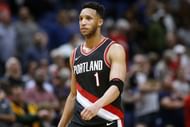
After a solid 2015-16 season, he cashed in on the Blazers' desperation to keep the band together. While Turner has always been a solid role player with a place in the league because of his defensive versatility and capability, he was given a contract far exceeding his current production. It almost felt like the Blazers were anticipating a leap in his production despite him finishing his sixth season in the league.
Instead, he has been just about the same player. His points per game average took a severe hit in the 2017-18 season.
He's always been a bad jumpshooter, but now those issues in his gameplay have magnified under the microscope because of the albatross neck contract that the Blazers are left with.
Turner signed a four-year, $70 million contract in 2016, but is playing worse than many players currently on veteran's minimum contracts.
#9 Ryan Anderson
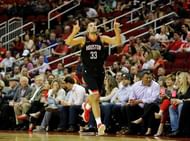
Ryno was expected to flourish in Houston due to their trigger-happy style of play from long range - the Rockets have led the league or been near the top of the pile in three-pointers attempted for over four seasons now.
'Moreyball', as their style of play has oft been referred to as, involves eliminating long mid-range jumpers and instead converting all of those corresponding looks to 3-point attempts.
Anderson signed a four-year, $80 million contract with Houston in 2016. His per-game production of 9.3 points on 38.3% 3-point shooting is what one would expect someone to give for the mid-level exception of $8 million, or maybe, in extreme cases, on contract worth $12-15 million annually.
In fact, if he'd been an offensive option with more workload on him as he did during his Magic and Pelicans days, there's a good chance that this contract would actually look cheap, given that his best statistical season for the Pels involved him scoring 19.8 points per game on a spectacular 43% conversion rate from downtown.
But in his current role, and given how he's been too much of a sieve defensively (especially in the playoffs), the Rockets have been hindered from adding a couple of two-way wing players.
#8 JR Smith
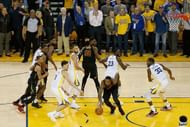
It is not in my nature to take shot at professionals who are far more skilled at their profession than I'm at my own. But JR Smith's refusal to take a shot at the end of Game 1 of the 2018 NBA Finals spoiled what could have been an epic series, both for Cavaliers as well as neutral basketball fans.
The same player who 'thought they were ahead' at the end of regulation in Game 1 was also the 61st-best-paid basketball player on the planet.
While JR certainly isn't an objectively bad NBA player, he's one of the streakiest players out there. On some nights, he can match Stephen Curry shot for shot (as he did for some time in Game 5 of the 2017 Finals), he averaged 8.3 points per game during the 2017-18 regular season campaign while playing some really on/off defense.
Cleveland will not be able to trade the two years remaining on his four-year, $52 million deal for anything of value.
#7 Chandler Parsons
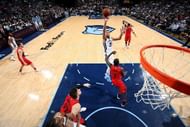
While we should never judge a contract based on the injury history of a player ever since the fact remains that Chandler Parsons had had legitimate health concerns during his time at Dallas.
On top of that, Parsons' best scoring average had come in his contract year with the Rockets, capping out at 16.6 points per game.
And yet, the Grizzlies gambled on him with a contract close to the max at 4 years and $94 million. Through two seasons in Tennessee now, Parsons has only played 70 total games, at an average of fewer than 20 minutes per game.
His contributions have literally been nothing to write home about, and the Grizzlies are in contractual hell for the next two years.
At least they drafted well this time around, getting one of the most NBA-ready players in the draft with Jaren Jackson Jr.
They don't have a first-round pick next year, and they'd rather be hoping that Parsons returns to some semblance of the form he showed with the Mavericks and the Rockets and that they'd be able to get some kind of production out of him.
#6 Ian Mahinmi
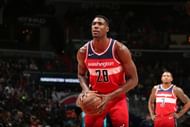
When we talk about starting caliber centers in the modern NBA, we're usually referring to players who have some sort of jump shot which they can build their offense around.
That is the reason why the likes of DeAndre Ayton, Marvin Bagley and Mo Bamba have been met with so much hype - these are players who can actually go out there and put some quality offense out for whichever team they play on.
With that being said, Ian Mahinmi is one of the worst fits in the league today. He cannot shoot a lick from beyond three feet out, and relies entirely on living in the paint to gain his points - not very well at that either.
The Frenchman has never finished a regular season campaign with a double-digit scoring campaign. The only thing he brings to the table is some rim protection, which used to be better during his days with the Pacers.
The Washington Wizards have put themselves in a position by trading Marcin Gortat to the Clippers to test Mahinmi as their starting center - unless they make more moves in free agency to get the likes of Capela, DeAndre Jordan or DeMarcus Cousins, who're all available this summer.
That will be tough, however, given that Mahinmi is on their books until 2020, and is earning a flat $16 million annually because of the four-year, $64 million deal he signed in 2016.
#5 Bismack Biyombo
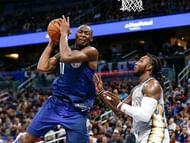
The only reason Bismack Biyombo has a place in the NBA today is the fact that he can be a good rim protector while finishing a lob or two off on the other end.
He barely has any shooting range to speak of, few post moves that he can realistically rely on to get buckets and is not particularly great at keeping up with smaller, niftier guards.
This is all the scouting information that one would have gleaned by watching tape of him playing on the Raptors' roster in the 2015-16 seasons.
For some reason, however, Orlando have him contracted for $72 million over four years, stretching until the end of the 2019-20 season.
They had a starting caliber center with legitimate shooting range in Nikola Vucevic, and they still went ahead and did that! It only serves them right to languish in the lottery places, for boneheaded decisions in free agency like that deserve results like this in the regular season.
#4 Miles Plumlee
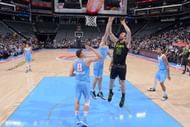
You might have found a fair sprinkling of centers on this list thus far. We are by no means finished yet, not even with this particularly untouchable contract that Miles Plumlee signed with the Milwaukee Bucks in the summer of 2016 - a four-year, $52 million contract.
Perhaps they mistook him for his brother Mason, who can still be considered an average NBA center given that he has a double-digit scoring campaign under his belt with Portland.
Miles, on the other hand, has not played more than an average of 18.6 minutes per game except the lone season he started for the Phoenix Suns (2013-14).
Since signing his contract, the older Plumlee brother has played in a total of 100 games - 32 with the Bucks and 13 with the Bobcats. He was sent the other way to Atlanta by Charlotte when they obtained Dwight Howard last summer.
His highest per-game scoring average for a single season is 8.1 points. Go figure, Milwaukee.
#3 Timofey Mozgov
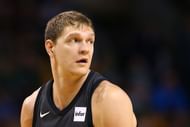
Timofey Mozgov has had a tumultuous NBA career thus far. Signed by the New York Knicks in 2010 after going undrafted, the Russian was moved to Denver as one of the bits and pieces who was sent the other way to make way for Carmelo Anthony.
He made his name there as a good rim protector and a lob threat, while being unafraid to get put on posters (Blake Griffin's Kodak moment springs to mind immediately).
He signed his first good contract with the Cleveland Cavaliers in 2014, and after injuries to Kevin Love and Kyrie Irving in the Finals, he emerged as their next best offensive option and was, in general, their second best player.
With the return of Love to the lineup and the shifting of Tristan Thompson to the center role, however, his minutes were once more restricted to bit-part appearances in garbage time.
The Lakers, however, deemed him worthy of a long-term contract for some reason, signing him up for four years and $72 million in 2016.
The Lakers were so weighed down in cap space because of this deal that they had to attach their No. 2 pick from the 2015 draft (D'Angelo Russell) to make cap room last summer. Mozgov appeared in 31 games, playing an average of fewer than 12 minutes in those appearances.
He still raked in $16 million in his bank account, though, all thanks to Jim Buss's ineptness in free agency.
Mozgov has since been traded to the Bobcats in exchange for Dwight Howard, who's expected to be waived by the Nets.
#2 Joakim Noah
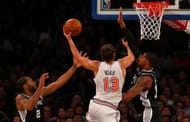
There used to be a time when signing Joakim Noah to a four-year, $72 million deal would be fully justified.
After all, in nine years of playing in the league, Noah had consistently demonstrated himself as one of the best defensive players in the league.
He won the Defensive Player of the Year title for 2013-14, was named to the All-NBA First Team and earned his second consecutive All-Star game appearance.
Miami Heat and the Warriors had, however, already established a blueprint of successful small ball teams, and the Bulls chose not to re-sign him to a new deal in 2016. The Knicks took the risk on him, as they did with Derrick Rose that same summer.
Both deals proved to be bummers, as Melo, Rose and Noah were unable to build up any kind of chemistry. The Knicks finished in the lottery places once more with a 38-44 record, and Rose was waived.
Noah has appeared in seven garbage-time games for a total of 40 minutes through this past season. He's essentially earned $1 million for every two minutes, 11.1 seconds of action, considering that he has a 4-year, $72 million deal in place.
Well, at least he sticks around with the team and motivates the young'uns. The next player on this list doesn't even have that role.
#1 Luol Deng
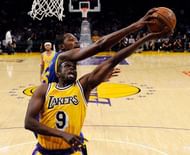
The last time Luol Deng played a minute of competitive basketball was the season opener for the Lakers last season, when he played 13 minutes and had two points, one assist, one steal and a turnover.
Ever since, he's been frozen out of the team's rotations by Luke Walton, who has explicitly been told to focus on the development of the Lakers' young talent at the wing positions.
This means that all the value the purple-and-gold brigade got from the 33-year-old was in the 2016-17 season when he appeared in 56 games and averaged 7.6 points and 5.3 assists.
All Deng has done for the past eight months is chill at Los Angeles' beaches while taking home a haul of $18 million annually.
He will probably do that for two more years at this rate since no franchise in the league will touch this contract with a bargepole now.
Do you agree with our list? Sound off your opinions in the comments section below!
Los Angeles Lakers Fan? Check out the latest Lakers depth chart, schedule, and roster updates all in one place.
